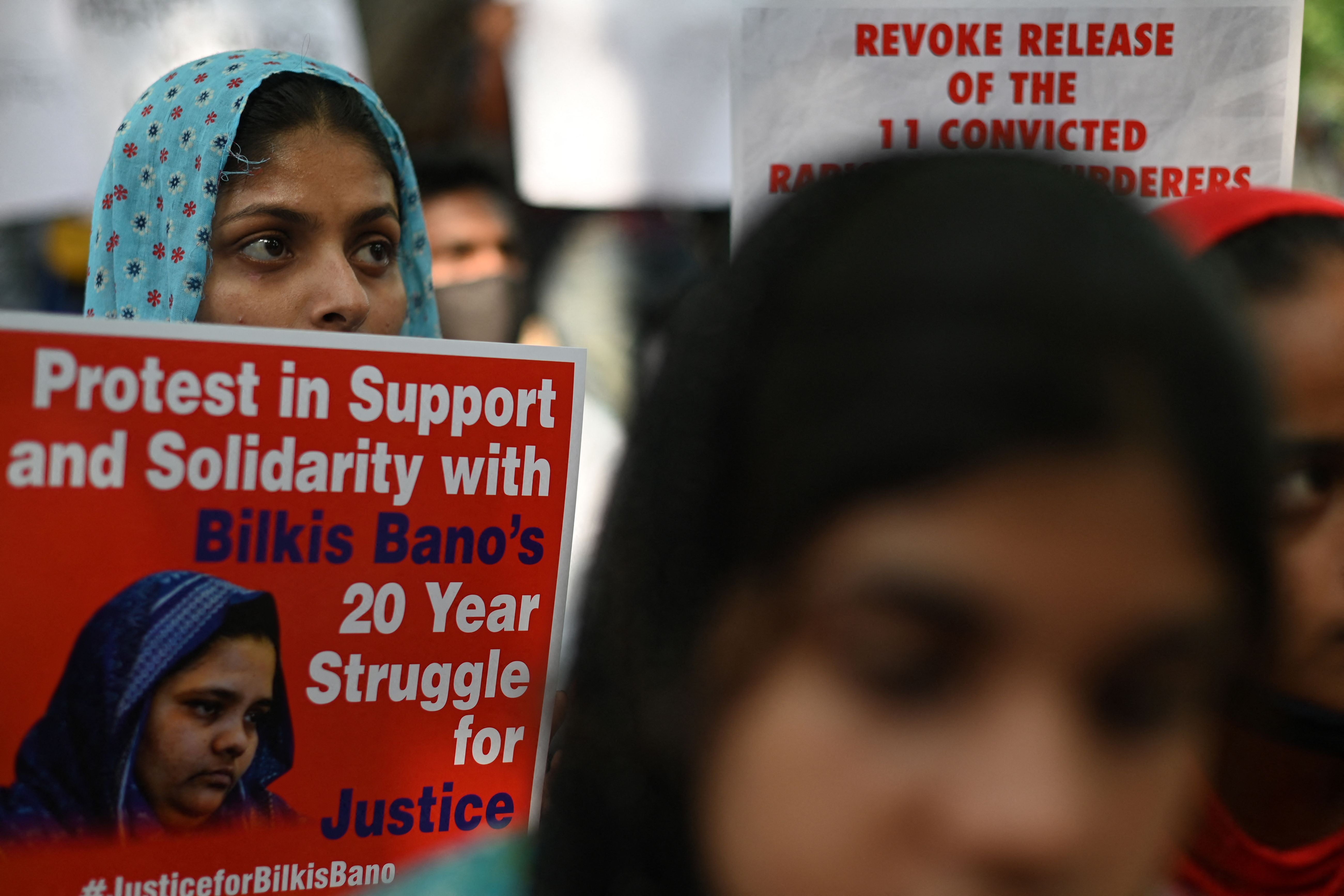Bilkis Bano case: Supreme Court rejects review plea by gangrape survivor against early release of 11 rapists
Bilkis Bano challenged the Supreme Court order allowing the Gujarat government to consider the remission plea of the 11 convicts

Your support helps us to tell the story
From reproductive rights to climate change to Big Tech, The Independent is on the ground when the story is developing. Whether it's investigating the financials of Elon Musk's pro-Trump PAC or producing our latest documentary, 'The A Word', which shines a light on the American women fighting for reproductive rights, we know how important it is to parse out the facts from the messaging.
At such a critical moment in US history, we need reporters on the ground. Your donation allows us to keep sending journalists to speak to both sides of the story.
The Independent is trusted by Americans across the entire political spectrum. And unlike many other quality news outlets, we choose not to lock Americans out of our reporting and analysis with paywalls. We believe quality journalism should be available to everyone, paid for by those who can afford it.
Your support makes all the difference.India’s top court rejected a plea filed by one of the gangrape survivors of the horrific Gujarat riots of 2002, Bilkis Bano, who had sought a review of the apex court’s May 2022 order by which it had asked the Gujarat government to consider a petition for the remission of the sentences of 11 convicts in the gangrape case.
Ms Bano was gangraped during the 2002 communal violence in Gujarat’s Dahod district when she was 21 years old and five months pregnant. Seven members of her family were killed while six others managed to run away. Ms Bano’s three-year-old daughter was one of those killed.
Ms Bano had sought review of the order passed on 13 May this year by the Supreme Court that said that the Gujarat government will have the power to grant remission to the 11 convicts as per the 1992 policy which did not bar early release in rape and murder cases.
The Supreme Court order was passed on 13 December by a bench of justices Ajay Rastogi and Vikram Nath. The court informed Ms Bano’s lawyer, Shobha Gupta, however, on Saturday of the dismissal of the review plea.
Earlier in August this year, the eleven men who were sentenced to life imprisonment in Ms Bano’s gangrape case were released from Godhra sub-jail on 15 August [India’s Independence Day] after a panel set up by the Gujarat government approved their application for remission of the sentence on account of “good behaviour”. They were welcomed with garlands and fed sweets.
At the time, several women’s rights groups and lawyers had condemned their release from the prison. Even Ms Bano issued a statement in which she asked “how can justice for any woman end like this? When I heard that the 11 convicted men who devastated my family and my life, and took from me my three-year old daughter, had walked free, I was bereft of words. I am still numb.”
The 11 convicts who were set free are Jaswant Nai, Govind Nai, Shailesh Bhatt, Radhyesham Shah, Bipin Chandra Joshi, Kesarbhai Vohania, Pradeep Mordhiya, Bakabhai Vohania, Rajubhai Soni, Mitesh Bhatt and Ramesh Chandana.
In May this year, hearing a plea by one of the 11 convicts, Radheshyam Bhagwandas Shah, the Supreme Court on 13 May had asked the Gujarat government to decide within two months, his application seeking “premature” release from prison, where he had spent more than 15 years following conviction in January 2008.
The apex court’s May ruling said that the “application for grant of premature release will have to be considered on the basis of the policy which stood on the date of conviction” and hence held that the “policy (for remission) with which the petitioner has to be governed, applicable in the State of Gujarat on the date of conviction, indeed is” the one “dated 9th July 1992”.
NDTV reported that the latest policy on remission says that gangrape and murder convicts cannot be granted early release, but the Supreme Court had agreed with the argument that the 1992 policy, which had no such exception, applied to these men.
That 1992 policy was, technically, in effect when the men were convicted in 2008.
Meanwhile, in her review petition, Ms Bano claimed that she had no information about the decision of the apex court paving way for the early release of the 11 convicts.
Ms Bano in her review plea had also stated that the Gujarat government was not the right state to take a decision as the trial was held in neighbouring Maharashtra. The trial had been moved to Mumbai on the Supreme Court’s instructions in 2004 after Ms Bano said a fair trial could not be held in Gujarat.
She has also separately filed a writ petition challenging the Gujarat government’s decision to release the convicts.
Reacting to the news, Delhi Commission for Women chief Swati Maliwal tweeted: “Supreme Court rejected Bilkis Bano’s plea. Bilkis Bano was gangraped when she was 21 years old, and her three-year-old son and six family members were murdered but Gujarat government freed all the rapists. If justice won’t come from Supreme Court, where will people go?”
Join our commenting forum
Join thought-provoking conversations, follow other Independent readers and see their replies
Comments